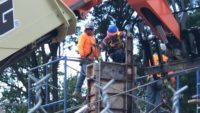Amazon Project Racial Harassment Lawsuit Faults Contractor's Probe
Suit also seeks to expand employer's liability in harassment cases.

Employees of the electrical contractor that worked on an Amazon warehouse project in Windsor, Conn. in 2021 have filed an unusual hostile workplace lawsuit in federal court in Hartford, Conn., accusing that firm, another project contractor and the online retail giant of failing to respond properly to the display of hangman's nooses meant to be seen by Black and Latino electricians.
Filed in late September, the suit by five electricians names as defendants the direct employer, Wayne J. Griffin Electric Inc., construction manager RC Andersen and Amazon.
The Amazon project's harassment incidents received wide media attention and triggered protests and demands for action by community leaders and elected officials. In the end, the Windsor police found proof of two noose displays, not eight, as was widely reported in the media. Amazon offered a $100,000 reward for information leading to arrests, but police never made an arrest.
One unusual aspect of the lawsuit is that it claims that Amazon and the contractors, whose staff was exposed to the nooses over several days, should have known there was the potential for such an incident because of a prior Amazon project noose incident four years earlier. With Griffin's electrician workforce "largely comprised of men of color," the lawsuit claims, the companies "failed to take appropriate remedial actions."
Whether such a novel legal approach will survive remains to be seen.
But a major portion of the events described in the lawsuit focuses on what prior racial harassment cases have hinged on: the response of the employer.
Companies generally do not face liability under Title VII of the 1964 Civil Rights Act if four conditions are met: the companies have clear anti-harassment policies and training, multiple means are provided for complaints, employers act swiftly to investigate and no supervisors were involved in the harassment.
In the suit, the five plaintiffs allege that the contractor suggested to FBI and police investigators that its own employees had put up the nooses, possibly in a bid to be transferred to better-paying prevailing wage government projects. That suggestion prompted police to subject the plaintiffs to lie-detector tests, and, the lawsuit states, that chain of events amounted to retaliation against the victims for complaining.
The adequacy of the response to harassment was an issue in a lawsuit by the Equal Employment Opportunity Commission in a case that settled in 2021 with contractor Hathaway Dinwiddie Construction Co. for $725,000. It involved about 20 employees exposed to racist graffiti in portable toilet facilities. Hathaway Dinwiddie denied there were any violations and said its supervisors did all they could to respond to the graffiti in places where hundreds of workers were on site.
More recently, a jury in another EEOC case found that supervisors of drilling contractor Coastal Drilling East had failed to act to stop racial taunts directed to a new Black crew member at well sites in Western Pennsylvania in 2019. A federal judge in Pittsburgh in September ordered the company to pay $80,000 to the former worker.
The deadline for a reply to the Windsor, Conn., suit is still weeks away.
A spokesman for Wayne Griffin Electric, declined to comment on the matter. R.J. Andersen could not be reached for comment, but it had in 2021 issued a statement noting that the company trains all workers on its projects in a “zero tolerance” policy related to racial and other forms of prejudice and provided whatever assistance law enforcement needed to investigate "this deeply offensive conduct."
Sam Stephenson, an Amazon spokesperson, said "hate, racism and discrimination" are "not tolerated at any site associated with [the firm,] whether under construction or fully operational." Amazon had previously noted its reward and support for additional jobsite cameras at the Windsor project. Stephenson said that due to the active legal proceedings, "we do not have further comment at this time.”




